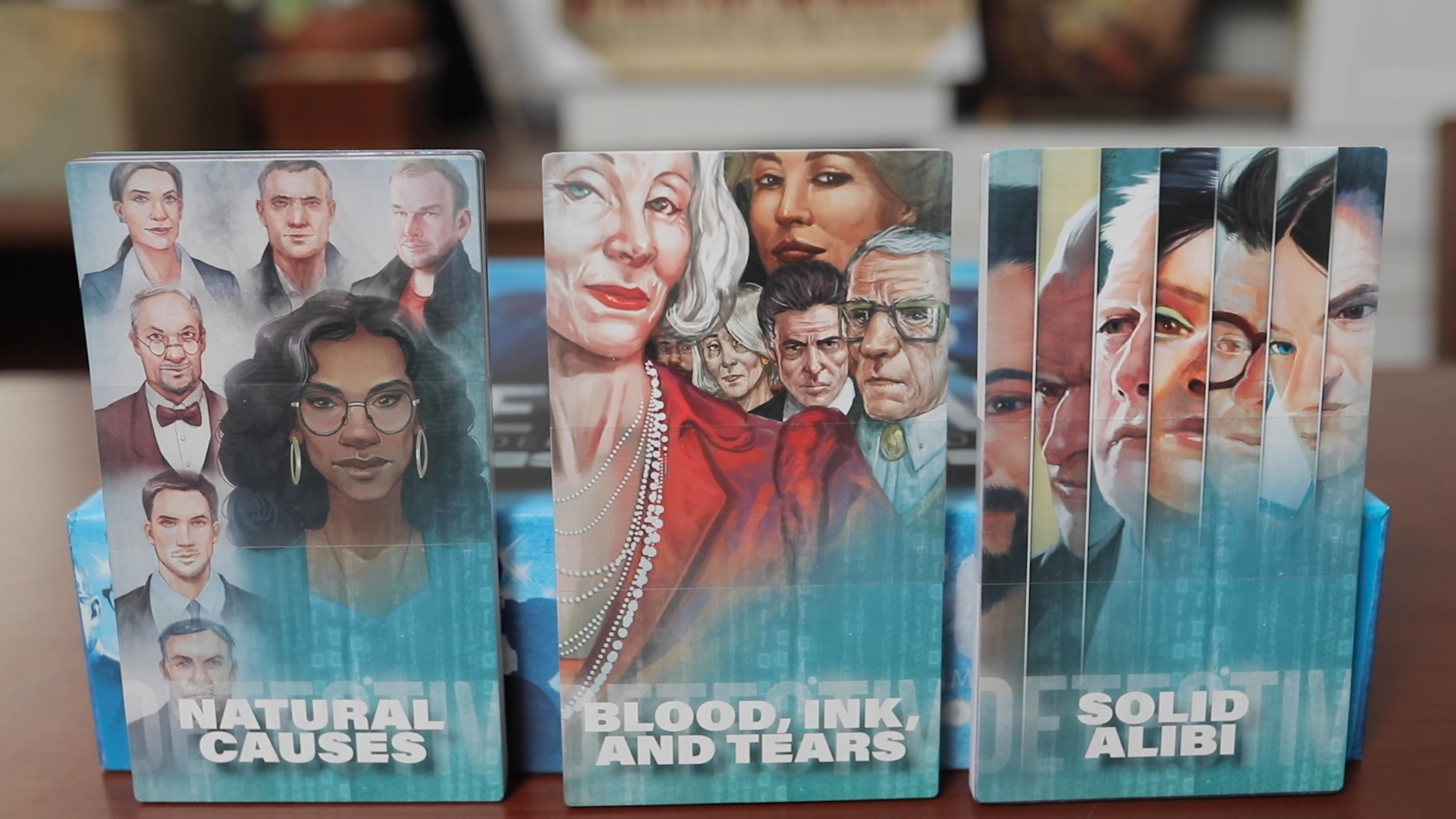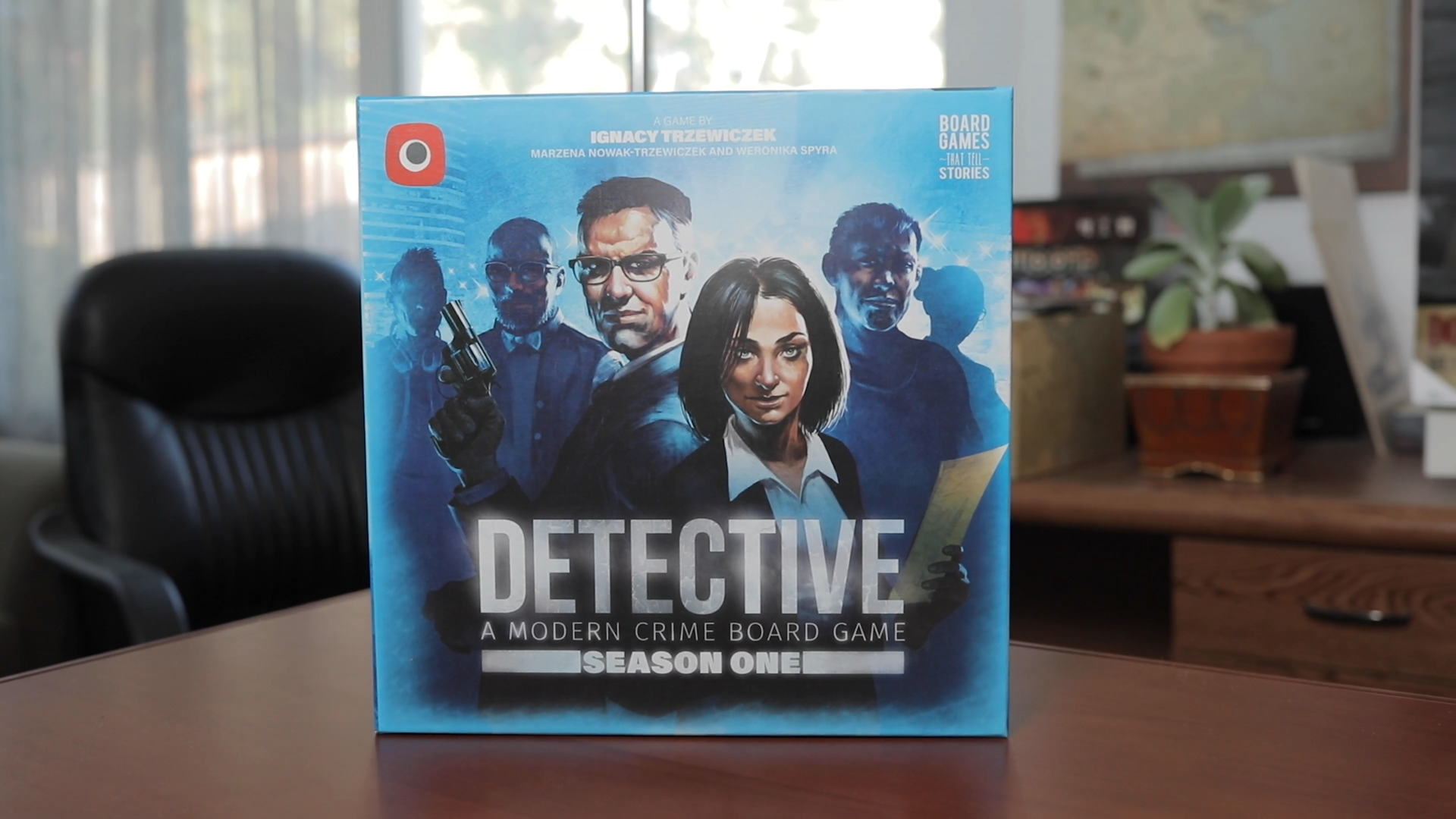Detective: Season One Review
Hits so many right notes for a streamlined detective game.
This streamlined version of Portal Games's original Detective is teachable in seconds for any group, with a mystery completed within the span of a 1.5-2 hr movie. 3 different mysteries remain completely cooperative for 1-5 players.
Video published October 17th, 2020

Solve 1 of 3 unique, fully fledged mysteries.

Character portraits help bring suspects to life.

Use the free browser database to assist your investigation.
This is a sponsored review.
Overview & How to Play
So you’ve read a bunch of detective stories, watched all of the mystery crime shows, and are ready to see how you’d do in solving your own case.
Or not, and you just wanna see how well you’ll do! Well, Detective: Season One this is a great starting point.
How it works is that you simply pick a case deck, or mystery to solve. Players then read that case’s opening prompt in the rulebook, which tells them their objective and how much time they have. By the way, all the objectives, in true Hollywood detective fashion, revolve around some type of murder, no need to worry about solving something stupid like fraud or tax-evasion.
Players will follow leads by drawing and reading cards that progress the narrative, driving to different locations, and of course consulting the database (provided app via online browser) to gather information. The key resource players will have to account for is time, which generally goes down when following new leads. When the detectives run out of time, they fill in their final report in the database to see whether or not they have successfully solved the case.
Pros
So technically, Detective: Season One is still a board game, and it has commendable pieces! There’s thick player boards to divvy up roles, incredible quality for the scenario cards, and wooden token for time and your current location on a non obtrusive board. There are plenty of things to examine and fiddle with during gameplay.
This is also a ‘modern crime’ board game, meaning you’ll use modern technology, so get out your digital devices to access this game’s database, a website where you look up and store information when prompted. In practice, this is super cool because it does so many things for game play, like tracking important data such as fingerprints, presenting information differently than the cards you’ll draw, and automating the final report—the questions you must answer to ultimately win the game. The website has overall a very flavorful and functioning UI that adds so much to the Detective experience. Like, punching in code numbers to read police databases is super thematic.
Now in the box, you’re going to get access to 3 engrossing stories. The first one is about a professor suddenly dying: it’s a great sampler of what a modern detective game can be, where you move around many locations with a healthy blend of database usage and lead cards. The second one is your classic “which one of you in this house is the murderer!?” This whodunit takes place in a murdered rich guy’s mansion, where you don’t use the car to travel, but instead walk throughout the house, going to different rooms and questioning all sorts of people from family members to servants. The third and last one is like an Italian gangster movie where you feel like the feds clamping down on the inner workings of Boston, with tons of database information available for those involved.
It’s impressive on how well the story is consistently delivered in every scenario. The game runs off of this carefully crafted engine where the facts seem to flow pretty comfortably regardless of what order you want to follow initial leads. The story seems to be carefully crafted first, and then broken up into the all the various database and lead cards, before finally sequenced in such a way as to ensure the gameplay plot works, even if players take unorthodox routes.
Detective encourages an inquisitive mindset by dropping open-ended clues everywhere; from the database, the opening prompt, and of course the numerous leads. Facts are constantly sprinkled in with flavor text and dialogue, meaning that you’ll be constantly engaged in a game of parsing out what’s important while still getting invested in the story. Nothing is really a total dead end, in fact, we haven’t found any lazily thrown-in useless leads after winning all of the three scenarios.
There’s roles you can divvy out, like analyst, researcher, narrator, etc. These don’t change Detective’s mechanics, and are by no means necessary to use, but they’re a great tool to organize your group. If you do so, you can get thoughts in order more clearly, or even use the included character names to role-play.
Quarterbacking, or one guy tells everyone else what to do, doesn’t really happen in Detective, since everyone is gonna have something that they can throw into the melting pot of ideas, and because of how open ended all the clues are, there’s so many ways your reasoning can go with how you think the events played out. This usually results in everyone refining each others’ ideas as they point out certain facts and details that all eventually culminate into a more complete picture of the case.
Cons & Nitpicks
An inherent lack of replayablity is just gonna be unavoidable with games like these, where solving a mystery for the second time around, even if you didn’t win the first time, loses a lot of its novelty. But, you can always ‘host’ the game for others, being the narrator and guiding them through the game without spoiling anything. The database app isn’t perfect either, with one big hiccup on the material evidence, but that may have been fixed by now.
Also scaling tokens are really wacky, since you get less tokens the more people you have, but that means at 5 players, you can literally never flip over cards to ‘Dig Deeper’ in the first scenario.
Final Thoughts
Overall though, Detective: Season One is a highly accessible game, that offers a lot to a bunch of different groups, while having that experience highly dictated by each group’s sleuthing tendencies. And that’s great! Its clear that the designer, Ignacy I-have-no-idea-how-to-pronounce-his-last-name, was very particular about designing the difficulty and scope of the scenarios to be way more accessible. The cases aren’t brain-wracking, they fit in a good time length and even have some humor sprinkled for some extra fun.













